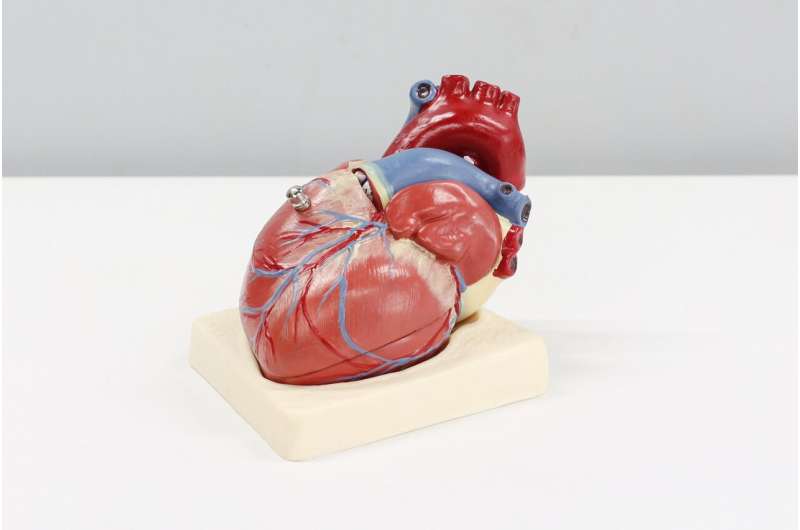Heart failure symptoms improve with a type 2 diabetes medicine

Canagliflozin, a medication used to treat type 2 diabetes, was found to greatly improve symptoms and quality of life within 3 months for people with heart failure due to either reduced or preserved cardiac function, even if they didn't also have type 2 diabetes, according to late-breaking research presented today at the American Heart Association's Scientific Sessions 2021.
More than 6 million Americans are estimated to have heart failure, which occurs when the heart isn't able to meet the body's need for blood and oxygen. Symptoms of heart failure include shortness of breath, tiredness and swelling in the feet and legs. A class of medications initially developed to treat Type 2 diabetes, called sodium-glucose co-transporter 2 (SGLT2) inhibitors, have recently been found to help improve survival and decrease hospitalization rates among adults with heart failure.
The primary goal of the "Canagliflozin: Impact on Health Status, Quality of Life and Functional Status in Heart Failure (CHIEF-HF)" trial was to examine whether canagliflozin could improve symptoms, function and quality of life for patients with heart failure with either reduced or preserved ejection fraction.
The study was a randomized placebo-controlled trial, and participants were able to complete the trial without any face-to-face visits by utilizing the self-report Kansas City Cardiomyopathy Questionnaire (KCCQ) administered on a smart phone.
"We did not know if a completely 'virtual' clinical trial, especially one where randomized treatment was delivered to participants and the outcomes were collected through a smartphone app, could work," says John A. Spertus, M.D., M.P.H., the study's lead author and professor and Daniel J. Lauer Endowed Chair in Metabolism and Vascular Disease Research at the University of Missouri-Kansas City School of Medicine. "Demonstrating the success of a decentralized clinical trial opens opportunities for applying this approach to the testing of other cardiovascular therapies that focus on health status."
CHIEF-HF enrolled and randomized 476 participants (average age of 63, almost 45% female) from 18 health systems across the U.S., 285 of whom had heart failure with preserved ejection fraction (when the lower left portion of the heart does not properly fill with blood), and the rest had heart failure with reduced ejection fraction (when the lower left portion of the heart does not properly pump blood). A total of 133 participants had type 2 diabetes. The study enrolled participants between March of 2020 and February of 2021.
To determine whether canagliflozin improved symptoms in people with heart failure, researchers used the KCCQ, a 23-item self-administered survey to measure patients' perception of their health status. The Total Symptom Score of the KCCQ converts participants' descriptions of their symptoms (e.g., fatigue, swelling or shortness of breath) from zero, indicating the most frequent and bothersome symptoms, to 100 (indicating no symptoms for the past two weeks).
Participants included in the study had to have a history of heart failure, a KCCQ score of 80 or less and a smartphone compatible with the study's mobile application. A total of 222 participants received canagliflozin, and 226 participants received a placebo. Researchers measured the patients' symptom reports at two, four, six and 12 weeks after taking 100 mg of canagliflozin or a placebo daily.
The study found:
- Participants who received canagliflozin reported significantly greater improvements in their heart failure symptoms, beginning within two weeks that were sustained throughout the entire three months of the trial.
- Participants with both reduced and preserved ejection fractions experienced these improvements, regardless of whether they had type 2 diabetes or not.
"These findings, together with the results of other SGLT2 inhibitor trials, are transformational and should have a significant impact on care," says Spertus. "The impact of this class of medicines on patients' function and quality of life is larger than many other medications used to treat heart failure, and they are very safe. Since improvement in health status is such a key goal for many patients, these findings support increasing the use of SGLT2 inhibitors for people with heart failure."
Researchers believe the success of the study through a virtual approach models a new approach to conducting clinical trials, and also suggests that SGLT2 inhibitor medications could potentially be prescribed through telemedicine care. The researchers suggest further research into ways to recognize, treat and monitor the health status of patients with heart failure in routine clinical care so more patients may benefit.
According to the researchers, limitations to the study include a relatively small sample size and an inability to collect detailed biochemical and imaging data due to the virtual, site-less nature of the trial.




















